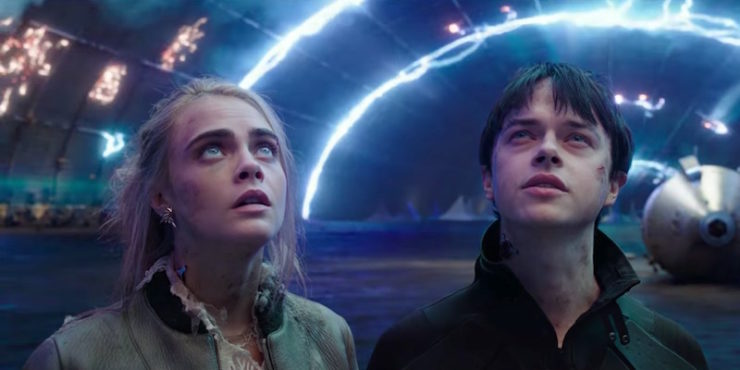It has been 20 years since the debut of Luc Besson’s The Fifth Element. That windup rainbow world of artifice and hodgepodge captured many viewers and left the world wondering why Besson refused to make more space opera movies when he clearly had am incredible knack for the genre. Valerian and the City of a Thousand Planets was to be an answer to that silence, and a pointed one too; the decades-running comics series that the movie sprang from is one that Besson drew heavily from in creating Fifth Element.
Safe to say, when Besson said in interviews that he rewrote the entire script after seeing Avatar, we should have known what we were in for. (Avatar, for all its visual innovation, didn’t exactly deliver on expert dialogue or intricate story subtleties.) As a result, despite the gorgeous settings and architectural hodgepodge that Besson excels at, Valerian fails utterly where it needs most to fly. How the story fails still manages to be an interesting exercise, particularly looking back at Fifth Element, which Valerian is so inextricably tied to.
[Spoilers for Valerian and the City of a Thousand Planets]
You have to begin with the strangest puzzle piece in the film’s assembly: the casting. It’s impossible to tell how old Valerian (Dan DeHaan) and Laureline (Cara Delevingne) are supposed to be, but the actors look like teenagers, and don’t act much older, unless we’re meant to believe that DeHaan’s faux-deepened “action hero” tenor is convincing by any measure. The narrative tells us that Valerian and Laureline are excellent and experienced operatives for the government roughly five centuries in the future, but there is nothing present in the story to truly convince us of this point; the duo routinely screw up and can’t seem to manage a mission without flirting both awkwardly and irritatingly, which is clearly supposed to be a plus somehow in their rapport.
Which brings us to Valerian’s greatest problem and central conceit—the plot revolves around the idea that Valerian is a galactic sex machine (he has an encyclopedia of women he as rolled around with, which he and Laureline call his ‘playlist’ for some godawful reason) who doesn’t believe in longterm relationships, but find himself in love with his partner. She insists that he only wants what he can’t have, but he asks her to marry him, and the question of whether or not she’ll say yes is what the audience is meant to follow with rapt interest throughout a story that has much bigger fish to fry. There is one gaping problem with this: Valerian is an unlikable crapsack. I cannot think of a nicer way of putting it, and what’s more, he’s not merely unlikeable… he also only has about half of a personality to begin with. The only things we hear him talk about are being good at his job and how much he wants Laureline to admit she’s in love with him, which are not enough traits to form a human being. They are enough traits to form a two-dimensional asshat who no one in their right mind would ever be charmed by, however.
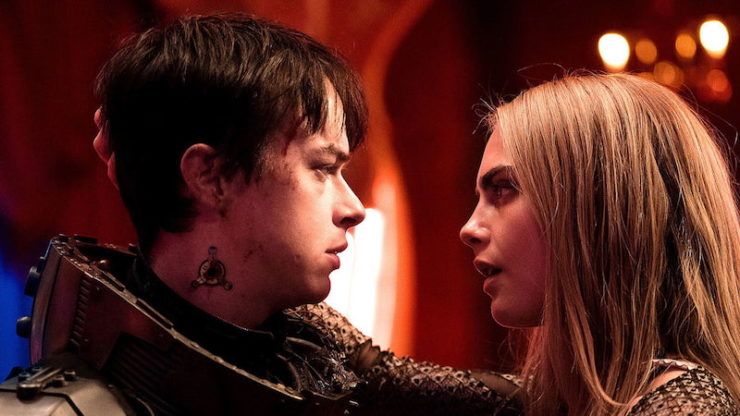
Laureline is equally sub-rendered as a person. The viewer is clearly supposed to gather that she is the brains of the operation as she tackles technical issues and ass-kicking with aplomb, but all she ever talks about is how she refuses to give into Valerian’s flirtations because he doesn’t trust her enough to let her take point on things. That is the only thing stopping her from jumping into his arms, apparently. Well, that and his playlist. This supposed superduo go on about how great they are for the government at every available moment, but they’re only ever accused of being unprofessional and difficult to manage by their superiors, so it is really hard to understand what we’re supposed to be impressed by.
(If anyone wants to start that tired old argument of ‘it’s because the film is based on a 50-year-old comic that contains ideas about love and sex that would be outdated now’…. don’t. There is no excuse for dialogue like this—unless it’s meant to be read as a pure parody. Your main female character does not need to start the film angry that her work partner forgot her birthday, and he doesn’t need to respond by “playfully” pinning her to a beach chaise and suggesting that they bone. Adaptations are meant to do what it says on the tin: adapt the source material. Part of adaption is getting rid of material and attitudes that no longer serve the narrative you are trying to build, not doubling down on romantic tropes that seem at home in your average John Wayne movie.)
Outside of this deeply flawed romantic plot, there is a far more interesting story at play. We learn that there is a threat to Alpha, the space station known as the “City of a Thousand Planets,” which our dream team is meant to neutralize. But as the layers are peeled back, this threat is proven nil. Instead, it turns out that the real nastiness comes in the form of a general from their own government (you can pretty much guess he’s the bad guy once you know that he’s played by Clive Owen), one who destroyed an entire planet and its indigenous civilization in a battle thirty years previous. A small number of these aliens survived and found their way to Alpha, and they have been working to rebuild their society piece by piece. Valerian and Laureline, recognizing that their government must make amends, need to switch sides and fight for people who have been wronged.
But first Valerian has to encounter Rihanna the Shapeshifting Alien Sex Worker and Ethan Hawke the Cowboy Space Pimp.
The strangest part about the above sentence is that this should obviously be the point where the movie utterly derails, and instead the opposite is true; this encounter is the only thing that injects life into this movie. Following his partnership with Bubble (that’s Rihanna), Valerian suddenly seems more human, which is in no small part due to Bubble’s refusal to spare his feelings on how ridiculous she finds him. The two of them rescue Laureline (she’s being held by a group of aliens who want to feed her to their king and you know what, it’s just not worth explaining this part don’t ask), but Bubble gets hit on their way out and ends up dying after telling a tearful Valerian to take care of the woman he loves.
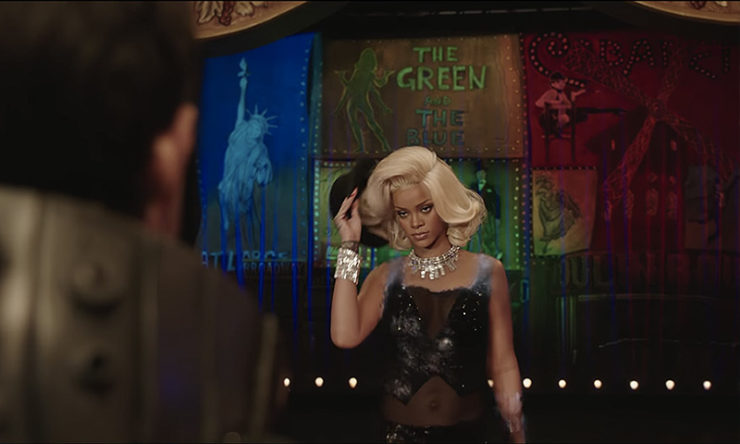
And if this is the part where you go “Huh, Luc Besson has a weird thing about blue alien women teaching male protagonists something about love and responsibility before dying their arms,” then you are top of the class! It’s also the point at which the effectiveness of The Fifth Element is most clearly juxtaposed to the clumsiness of Valerian; somehow in these completely parallel scenarios, Fifth Element manages to display both more naiveté and more maturity than Valerian does. Korben Dallas’s catharsis when hearing the Diva sing is what opens him up to the prospect of falling in love again, and that love is wrapped up in the later choice to be vulnerable before Leeloo—a tall order for a man still reeling from his recent divorce. It is the mature decision of a person who has already experienced emotional pain opening himself up to the possibility of more pain in hopes of gaining something better. But Valerian’s artistic revelation—and it is pointedly framed as art in the same way that the Diva’s performance is art; Valerian calls Bubble “an artist” more than once after seeing her morphing sex fantasy dance routine, and that is what resonates in him, the artistry of her performance—is bound up in the journey of a woman who has lived a much darker life than anything he has known.
Bubble is an illegal alien on Alpha, with no rights and no one to turn to. Valerian promises to use his government clout to fix that problem for her, but her assistance in his quest to save Laureline is ultimately what gets Bubble killed. Valerian has to reckon with the fact that his choice to enlist her help leads to her death, and come face to face with the idea that his life is a comparatively easy thing that he still finds room to whine about. It could be a scathing commentary about privilege, but it lands awkwardly because Valerian doesn’t have enough room for emotional vulnerability that would make this horrific turn in the narrative worthwhile.
Instead, he finds some small measure of this vulnerability after Laureline insists on going against their government directives, when she demands that they give the matter converter (that’s the MacGuffin) to the wronged alien group without permission from their bosses. Her insistence that Valerian trust her and hand over control of their mission results in the smallest of breakthroughs, and he finally gains a measure of humility. But it still falls short of all the turmoil that The Fifth Element manages to work through… which is baffling considering that fact that the older film doesn’t go out of its way to address those themes.
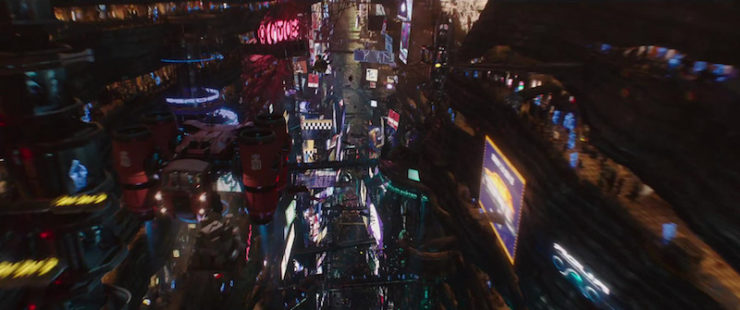
There are so many plotholes in Valerian that it’s a mistake to try and count them all. In addition, the split focus between Valerian and Laureline’s blossoming how-can-this-pass-for-a-love-story and all the intrigue around Clive Owen’s evil doings results in a destructive amount of exposition in the final half hour of the film. There are also a lot of very unfunny jokes (including a bunch about having a ‘girl inside you’ when they learn that Valerian has been carrying a shade of an alien princess’s spirit). Despite Besson’s insistence on creating “optimistic” visions of the future, there is very little optimism to be found in Valerian, in large part due to the cavalier attitudes the two central characters seem to have toward everything except each other for the majority of the film.
It’s all a damned shame because there are some beautiful themes at work here. Cooperation, learning to trust, the acknowledgement that when you do wrong by someone (or a whole group of someones) you don’t continue doing wrong by them to save your own skin. And there is true technical innovation at play in the film, some of the greatest seen in the past decade. The upcoming Ready Player One film is going to have difficulty matching up to the work Valerian has done with the concept of virtual reality and inter-dimensional interaction, as the opening operation that Valerian and Laureline execute is one of the most intricate, impressive sequences that cinema has seen in ages. The soundtrack is dazzling and the imagery (provided mostly in advance due to the groundwork laid by the comic) is stunning enough to warrant the film’s existence regardless.
But the most promising thing about the movie is shoved into the first three minutes: a montage detailing how Alpha came to be. At the start, we see humanity coming together to build out their space station, many peoples gathering, embracing, shaking hands as the years go by and more nations join the endeavor. Then… aliens. They arrive and humans shake hands with each species they welcome. Some of them have metal hands, and some of them have tentacles, and some of them are covered in slime, but they are greeted as equals. And then Alpha grows too large and must be released from Earth’s orbit so that it can continue to makes its way across the cosmos as a beacon of unity and camaraderie. Three minutes in, and I was in tears. Then the rest of the movie arrived and it was like an abrupt deflation of the world’s biggest balloon.
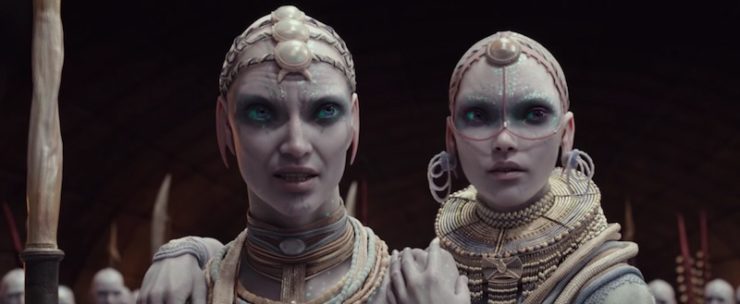
Valerian and the City of the Thousand Planets should have been an ode to that future, and somehow it got bogged down in the love story between two children who have barely accessed their emotional control panels. Had the film chosen to center on a non-romantic love, perhaps, a building of trust between two partners, we would have seen something special. But it’s hard to be optimistic about a future where your trusted coworker has a “playlist” of women on his computer and Clive Owen commits genocide against a peaceful race of tall, gender non-conforming, pearl-gathering, iridescent faeries.
It’s just too bad, because those three minutes were truly extraordinary.
Emmet Asher-Perrin would like to watch the film’s opening on repeat. You can bug her on Twitter and Tumblr, and read more of her work here and elsewhere.










